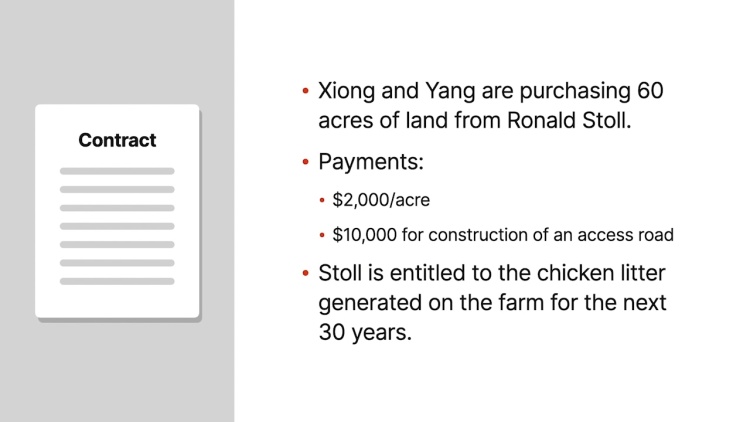Stoll v. Xiong
Oklahoma Court of Civil Appeals
241 P.3d 301 (2010)
- Written by Rose VanHofwegen, JD
Facts
Chong Lor Xiong and Mee Yang (defendants) immigrated to America and could read little English. When they bought a chicken farm next door to Xiong’s sister and her husband, seller Ronald Stoll (plaintiff) gave them a preliminary contract to review that specified a price of $2,000 per acre. Stoll included a clause that required giving all the chicken litter to Stoll for free for 30 years. Xiong’s sister reviewed the contract with the couple, but she also had limited fluency, and none of the three understood the clause. Two months later, the couple signed a final contract incorporating those terms. After the first cleanout, Xiong traded chicken litter to others, and Stoll sued to enforce the litter provision. The couple explained they did not understand how the contract could give something valuable to Stoll for free. Stoll testified that the value of his land was actually about $2,000 per acre when sold, and he estimated the value of chicken litter from regular de-caking—not including complete cleanouts and before oil prices drove up commercial fertilizer costs—was at least $216,000 over 30 years. That meant the couple would wind up essentially paying Stoll an additional $3,325 per acre over and above the $2,000 stated purchase price. The judge declared the free-litter clause the most unconscionable contract term he had ever read and refused to enforce it. Stoll appealed.
Rule of Law
Issue
Holding and Reasoning (Hetherington, J.)
What to do next…
Here's why 906,000 law students have relied on our case briefs:
- Written by law professors and practitioners, not other law students. 47,100 briefs, keyed to 996 casebooks. Top-notch customer support.
- The right amount of information, includes the facts, issues, rule of law, holding and reasoning, and any concurrences and dissents.
- Access in your classes, works on your mobile and tablet. Massive library of related video lessons and high quality multiple-choice questions.
- Easy to use, uniform format for every case brief. Written in plain English, not in legalese. Our briefs summarize and simplify; they don’t just repeat the court’s language.





